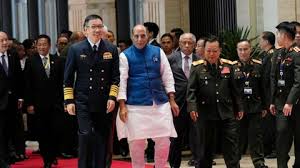NEW DELHI: India has reiterated that the upcoming code of conduct for the regulation of maritime activity in the South China Sea needs to be consistent with the international law and should not prejudice legitimate rights and interests of nations not party to the ongoing discussions on framing the code.
Addressing the 11th ASEAN Defence Ministers’ Meeting-Plus Forum at Vientiane, Laos, Defence Minister Rajnath Singh on Thursday said, “India would like to see a code that is fully consistent with the international law, in particular the UN Convention Law of Sea 1982.”
He said, “India has always advocated and practised dialogue for resolving complex international issues. This commitment to open communication and peaceful negotiation is evident in India’s approach to a wide range of international challenges, from border disputes to trade agreements.
“India believes that genuine, long-term solutions to global problems can only be achieved when nations engage constructively, respecting each other’s perspectives,” he added.
Rajnath Singh drew attention to the global commons the shared natural resources and ecosystems essential to sustaining life and bringing prosperity on the planet saying there was a need to safeguard these global commons.
Earlier in July this year, External Affairs Minster S Jaishankar while speaking at the 14th East Asia Summit Foreign Ministers’ Meeting at Laos had mentioned the need to align the code of conduct with the international laws.
A code of conduct is being discussed among six countries — the Philippines, China, Taiwan, Vietnam, Malaysia and Brunei — that are party to the maritime boundary dispute in the South China Sea. These countries have been discussing a code of conduct forced upon the claimants by China that did not accept a UN verdict on the demarcation of the maritime boundary.
Beijing had refused to accept a UN verdict on the demarcation of maritime boundaries in the South China Sea. The UN verdict was based on UNCLOS (United Nations Convention on the Law of the Sea) — regarded as the global constitution for the seas signed by 162 nations including China. Beijing claims the entire South China Sea as its territory. Through it pass cargo ships travelling between the Indian Ocean and Pacific Ocean. India and several other countries like the US, the UK, Japan and Australia would be effected by the code of conduct.


